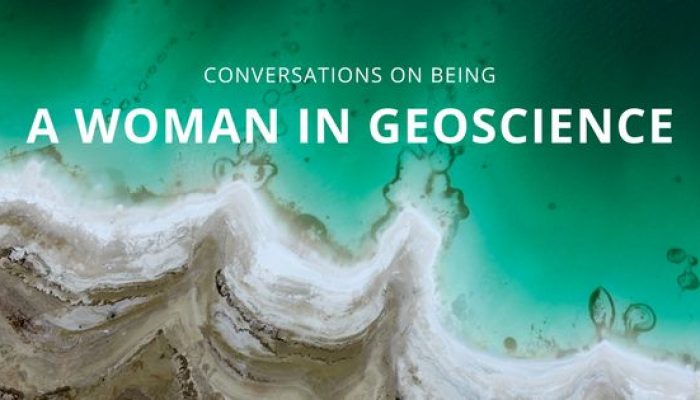
While at this year’s General Assembly in Vienna, Keri McNamara, one of the EGU’s press assistants, spoke to a number of female geoscientists (at different career stages), to get their perspective on what being a female in geosciences is like.
At this year’s EGU General Assembly I decided to construct a blog out of conversations I had with several women in geoscience, to learn about their research and experiences. While I’ve been lucky enough to be supported by many amazing female scientists, I know that this isn’t always the case for others who have felt undervalued or overlooked.
This year at the EGU’s General Assembly year there have been great sessions on addressing gender inequality in the geosciences. Many celebrated the gains made in a generation in terms of female participation in science. Others painted a concerning picture of male dominance especially at the higher levels.
In the EGU for instance, all of the medal awards are named after male geoscientists and only 22% of them were awarded to women in 2017. There is a gender imbalance at all levels in the EGU membership statistics but the early career scientists have the most female input with an encouraging 35% of the share.
In the charming age of ‘grab ‘em by the pussy’ it is more important than ever to ensure that women from all backgrounds feel they can be amazing scientists. It’s about fighting the male smirk when you say you’re learning python, refusing to feel embarrassed squatting behind a bush while on a field trip or demanding not to be pressured to turn down that post-doc because you want to have a kid.
Below you’ll find the interviews with several women in geosciences, from PhD students to CEOs. I hope they are a source of information and inspiration for other female geoscientists. As Dr Véronique Garçon of Future Earth (an international research platform for the advancement of Global Sustainability Science) said in her EGU talk on promoting equality:
Never give up!
Chris McEntee: CEO and Executive director of the American Geophysical Union (AGU).
AGU is a 60,000-person earth and space science membership organisation with 40% of its members from 136 countries outside the United States. She has been the first woman CEO of three different membership organisations including AGU.
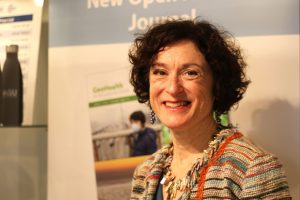
If you want to take on a leadership position get training to be an effective leader, says Chris McEntee. (Credit: EGU/Kerri McNamara).
What are your experiences of being a woman in a leadership position?
I think things have improved over time. It’s much better in the US than other countries. At the same time I still think there’s a lot of problems. AGU has delved into sexual harassment, bias and discrimination and the stories are pretty alarming. There’s some unique things in geosciences because of field and ship experiences that can make women more vulnerable in certain situations.
What are you doing to address this?
In the past couple of years AGU has been trying to increase awareness through town halls and our sessions at our general meeting. Last year we received some funding from the National Science Foundation to bring together leaders in science societies and expert individuals on the treatment of women. Out of that has come a new AGU initiative on ethics and harassment. It will have tools, resources, bystander training, and workshops.
We want to continue the research too. The data is pretty compelling – a very substantial number of women have experienced sexual harassment in some way. We’ve also learned that meeting the legal standard for harassment and discrimination is difficult- it’s a very high bar. So there is a lot that occurs that might not meet the legal definition. We really have to stop it at the beginning by changing this culture.
We also need to provide a space so that if a woman is feeling something is inappropriate, but it’s not too serious, they have somewhere they can talk about it. Last year at the AGU Fall Meeting we had a ‘safe AGU’ campaign where staff and volunteers had buttons and said ‘if you feel unsafe, come to one of us and we can help you’. We are updating our code of ethics for our members to include harassment and discrimination as behaviors that are inappropriate.
What would you say to young women in science who hope to take leadership positions?
Get training to be effective leaders. It can be hard to find the time to add this type of training as the work of science is so demanding. Also find peer support groups and mentors who share your experience and can provide advice, counsel and support.
There are some great options available such as the Association for Women Geoscientists and the Earth Science Women’s Network. You are not alone and there are people who want to help. If you feel something’s not right, don’t think it’s you. Find someone that can help you think it through- there are a lot of men who are also supportive!
Dr Claudia Alves de Jesus-Rydin: Research Programme Officer at the European Research Council (ERC).
Claudia is also the coordinator of the gender activity group in the scientific department at ERC and an active member of the working group on gender balance in the scientific council of the ERC.
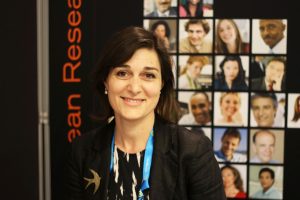
Claudia Alves de Jesus-Rydin feels women can find self-promotion harder. (Credit: EGU/Keri McNamara)
What are your experiences of being a woman in Geoscience?
I have to refer to the data that I observe at the ERC. We see that there is a change from the starting grant through to the advanced grant. What is really amazing is that systemically, in the Earth Systems Sciences, female applicants have higher success rates than male applicants at the starting grant and consolidated grant level: The female applicants are pretty competitive. The biggest issue I observe is the submission rate.
Of course there is the risk that once you increase the submission rate, maybe there will be a drop of the success rate. The community is filtering themselves before they submit, perhaps they only submit if they are very strong? At the moment the key thing is encouraging more women to apply.
Why aren’t more women applying?
Often the problem is that women find the prospect of rejection harder.
There is this joke: ‘there is this guy in a bar and he walks up to a woman and he tries to buy her a drink. Eventually she gets really fed up and she says “Look, you have a one in a million chance with me” and the man replies “Yes! I knew I had a chance!”. If a woman got a reply like that they would just grab their things and move but a guy thinks ‘yes I have a chance’.
Also, self-promotion can be harder for women; the profile of car salesman is a very male one. I’ve heard woman say ‘ I don’t want to write a proposal saying how good I am.’ We really need women to push harder.
What about early career scientists?
I think early career scientists are doing well, but later on in their careers there is always the issue of the family. I think that’s when most support is needed; from colleagues, institutions, supervisors and partners at home.
I think role models are a great way to address this; to show it is possible. You don’t have to sacrifice your personal life, you can still have a good balance being a good Mom, a good woman and a good scientist; a scientist that has achieved really great things.
Helena Łoś: PhD student at Warsaw University, Poland.
Can you tell us about your research?
My background is Geodesy and I specialise in photogrammetry and remote sensing. I work with satellite SAR (synthetic aperture radar) data. I compare data with different parameters to check how the values influence the possibility of the detection of river ice.
What about your experiences as a woman in Geosciences?
I don’t find there’s a big difference in terms of gender in geosciences. I think it’s most difficult in the future; often a post-doc is short-term, perhaps 3 years. If you want to have a family you might want to have a year off for maternity leave and that could become problematic.
Dr Nolwenn Le Gall: a post-doc at the University of Manchester.
Nolwenn completed a PhD at Université d’Orléans, CNRS, France
What is your research area?
I am an experimental volcanologist working on the degassing of basaltic melts. I’m trying to reproduce natural processes. My PhD was on bubble nucleation. Now I work on the same things but looking at crystallisation instead. It’s still basaltic melts and the conduit so similar experiments. But now I will have to do some experiments in-situ too.
It’s really nice that my post-doc is three years, I don’t have to apply for new position. I have some technique development that will take time so it’s useful to have a longer post-doc.
How do you feel as a woman in geosciences?
I feel fine. I don’t really see differences. You see more problems higher up- there are more men. But that was before and I think now, during conferences we see that there are a lot of women giving talks and posters. It seems to be almost a 50:50 gender balance. I’ve never had any problems with men treating me differently because of my gender.
What advice would you give to other women who want to become geoscientists?
Do what you like. Just enjoy it- if you enjoy your work, that’s always better.
Dr. Grace Shephard: researcher at the University of Oslo.
She completed her PhD at the University of Sydney and is now well into her second post-doc. She is also received the Arne Richter Award for Outstanding Young Scientists at EGU in 2016.
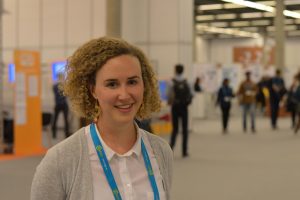
“If, professionally, something positive happens to you I think you should try to bring up the other women you work with,” says Grace Shephard. (Credit: EGU/Kai Boggild)
What are you research interests?
I have a few different avenues of research. I’m primarily working with plate tectonics in the Arctic region so I research how the Arctic Ocean opened and how the surrounding continents and oceanic plates have shifted about. To investigate how and when an ocean subducted deep into the mantle, I try to integrate lots of different datasets, including on global scales. I completed a three year post-doc at the University of Oslo and then I was lucky enough to get my own funding to continue.
What are your experiences of being a woman in geosciences?
I’ve been following with interest the recent article in Nature about molehills building up against women in geoscientists specifically. I can only speak from my own experience- but I’ve never found it a big issue. I’ve been lucky that I’ve had very supportive supervisors and environment to work in. I have experienced isolated throw-away comments at conferences but I don’t let it define the geosciences and my experiences, so I just move on.
What would you recommend to young geoscientists?
Identify researchers you are interested in, and will enjoy working with, and don’t be shy to approach them with an idea and see how it goes. I think you have to be quite proactive and that’s something that you have to go through with the transition of when you become your own independent researcher.
Also, you should support people- it goes both ways. If, professionally, something positive happens to you I think you should try to bring up the other women you work with. I guess in the context of EGU- I was very fortunate to receive an award last year. I was nominated by two senior female researchers so I feel the need to give back to the community even more so.
Interviews by Keri McNamara, a volcanology PhD student at the University of Bristol who worked at the EGU meeting as a press assistant.
Editor’s note: This is a guest blog post that expresses the opinion of its author and those who participated in the interviews, whose views may differ from those of the European Geosciences Union. We hope the post can serve to generate discussion and a civilised debate amongst our readers.

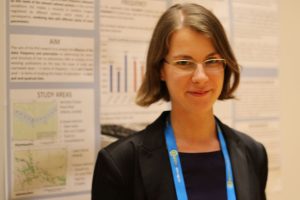
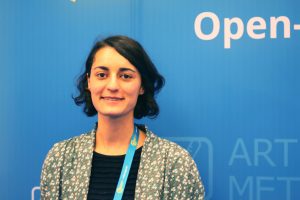
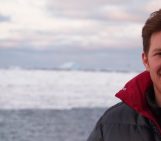

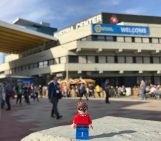
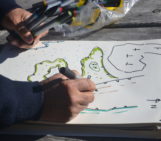
Elisabeth Kosters
I wrote about this too: https://earthsciencesociety.com/2017/03/08/my-brilliant-career-a-woman-geoscientist-looks-back-on-iwd2017/